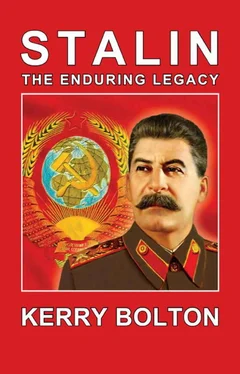What might be regarded by many as an ‘eccentric’ element from the Right were not alone in seeing that the USSR had undergone a revolutionary transformation. Many of the Left regarded Stalin’s Russia as a travesty of Marxism. The most well-known and vehement was of course Leon Trotsky who condemned Stalin for having ‘betrayed the revolution’ and for reversing doctrinaire Marxism. On the other hand, the USA for decades supported Marxists, and especially Trotskyites, in trying to subvert the USSR during the Cold War. The USA, as the columnists at Common Sense continually insisted, was promoting Marxism, while Stalin was fighting it. This dichotomy between Russian National Bolshevism and US sponsored international Marxism was to having lasting consequences for the post-war world up to the present.
Stalin Purges Marxism
The Moscow Trials purging Trotskyites and other veteran Bolsheviks were merely the most obvious manifestations of Stalin’s struggle against alien Marxism. While much has been written condemning the trials as a modern day version of the Salem witch trials, and while the Soviet methods were often less than judicious the basic allegations against the Trotskyites et al were justified. The trials moreover, were open to the public, including western press, diplomats and jurists. There can be no serious doubt that Trotskyites in alliance with other old Bolsheviks such as Zinoviev and Kameneff were complicit in attempting to overthrow the Soviet state under Stalin. That was after all, the raison d’etre of Trotsky et al, and Trotsky’s hubris could not conceal his aims. [8] See Chapter III: ‘The Moscow Trials in Historical Context’.
The purging of these anti-Stalinist co-conspirators was only a part of the Stalinist fight against the Old Bolsheviks. Stalin’s relations with Lenin had not been cordial, Lenin accusing him of acting like a ‘Great Russian chauvinist’. [9] R Service, Comrades: Communism: A World History (London: Pan MacMillan, 2008), 97.
Indeed, the ‘Great Russians’ were heralded as the well-spring of Stalin’s Russia, and were elevated to master-race like status during and after the ‘Great Patriotic War’ against Germany. Lenin, near death, regarded Stalin’s demeanour as ‘offensive’, and as not showing automatic obedience. Lenin wished for Stalin to be removed as Bolshevik Party General Secretary. [10] Ibid., 98.
Dissolving the Comintern
The most symbolic acts of Stalin against International Communism were the elimination of the Association of Old Bolsheviks, and the destruction of the Communist International (Comintern). The Comintern, or Third International, was to be the basis of the world revolution, having been founded in 1919 in Moscow with 52 delegates from 25 countries. [11] Ibid., 107.
Zinoviev headed the Comintern’s Executive Committee. [12] Ibid., 109.
He was replaced by Bukharin in 1926. [13] Ibid., 116.
Both Zinonviev and Bukharin were among the many ‘Old Bolsheviks’ eliminated by Stalin.
Stalin regarded the Comintern with animosity. It seemed to function more as an enemy agency than as a tool of Stalin, or at least that is how Stalin perceived the organisation. Robert Service states that Dimitrov, the head of the Comintern at the time of its dissolution, was accustomed to Stalin’s accusations against it. In 1937 Stalin had barked at him that ‘all of you in Comintern are hand in glove with the enemy’. [14] G Dimitrov, Dimitrov and Stalin 1934-1943: Letters from the Soviet Archives, 32, cited by R Service, ibid., 220.
Dimitrov must have wondered how long he had to live. [15] R Service, ibid., 220.
Instead of the Communist parties serving as agents of the world revolution, in typically Marxist manner, and the purpose for founding the Comintern, the Communist parties outside Russia were expected to be nationally oriented. In 1941 Stalin stated of this:
The International was created in Marx’s time in the expectation of an approaching international revolution. Comintern was created in Lenin’s time at an analogous moment. Today, national tasks emerge for each country as a supreme priority. Do not hold on tight to what was yesterday. [16] G Dimitrov, op. cit., cited by Service, ibid., 221.
This was a flagrant repudiation of Marxist orthodoxy, and places Stalinism within the context of National Bolshevism.
The German offensive postponed Stalin’s plans for the elimination of the Comintern, and those operatives who had survived the ‘Great Purge’ were ordered to Ufa, South of the Urals. Dimitrov was sent to Kuibyshev on the Volga. After the Battle of Stalingrad, Stalin returned to the issue of the Comintern, and told Dimitrov on 8 May 1943 to wind up the organisation. Dimitrov was transferred to the International Department of the Bolshevik Party Central Committee. [17] R Service, ibid., 222.
Robert Service suggests that this could have allayed fears among the Allies that Stalin would pursue world revolution in the post-war world. However, Stalin’s suspicion of the Comintern and the liquidation of many of its important operatives indicate fundamental belligerence between the two. In place of proletarian international solidarity, Stalin established an All-Slavic Committee [18] Ibid.
to promote Slavic folkish solidarity, although the inclusion of the Magyars [19] Hungarians.
was problematic.
Stalin throughout his reign undertook a vigorous elimination of World Communist leaders. Stalin decimated communist refugees from fascism living in the USSR. While only 5 members of the Politburo of the German Communist Party had been killed under Hitler, in the USSR 7 were liquidated, and 41 out of 68 party leaders. The entire Central Committee of the Polish Communist Party in exile were liquidated, and an estimated 5000 party members were killed. The Polish Communist Party was formally dissolved in 1938. 700 Comintern headquarters staff were purged. [20] Richard Overy, The Dictators: Hitler’s Germany and Stalin’s Russia (London: Allen Lane, 2004), 201.
Among the foreign Communist luminaries who were liquidated was Bela Kun, whose psychotic Communist regime in Hungary in 1919 lasted 133 days. Kun fled to the Soviet Union where he oversaw the killing of 50,000 soldiers and civilians attached to the White Army under Wrangel, who had surrendered after being promised amnesty. Kun was a member of the Executive Committee of the Comintern. A favourite of Lenin’s, this bloody lunatic served as a Comintern agent in Germany, Austria and Czechoslovakia during the 1920s. In 1938 he was brought before a tribunal and after a brief trial was executed the same day. [21] L I Shvetsova, et al. (eds.), Rasstrel’nye spiski: Moskva, 1937-1941: …Kniga pamiati zhertv politicheskii repressii. (‘The Execution List: Moscow, 1937-1941: …Book of Remembrances of the victims of Political Repression’), (Moscow: Memorial Society, Zven’ia Publishing House, 2000), 229.
Another action of great symbolism was Stalin’s moves against the ‘Old Bolsheviks’, the veterans of the 1917 Revolution. Leon Sedov, Leon Trotsky’s son, in his pamphlet on the Great Purge of the late 1930s, waxed indignant that Stalin ‘coldly orders the shooting of Bolsheviks, former leaders of the Party and the Comintern, and heroes of the Civil War’. [22] L Sedov, ‘Why did Stalin Need this Trial?’, The Red Book on the Moscow Trials, http://www.marxists.org/history/etol/writers/sedov/works/red/ch01.htm
‘The Association of Old Bolsheviks and that of the former political prisoners has been dissolved. They were too strong a reminder of the “cursed” revolutionary past’. [23] Ibid., ‘Domestic Political Reasons’.
Читать дальше












